
The politics of Mongolia takes place in a framework of a semi-presidential multi-party representative democracy. Executive power is exercised by the prime minister, who is the head of government, and the Cabinet. The president is the head of state, but holds limited authority over the executive branch of the government, unlike full presidential republics like the United States. Legislative power is vested in parliament. The judiciary is independent of the executive and the legislature.

Nambaryn Enkhbayar is a Mongolian politician. He served as the Prime Minister of Mongolia from 2000 to 2004, as Chairman of the State Great Khural from 2004 to 2005, and as President of Mongolia from 2005 to 2009. He is the first person to have held all of the top three positions in the Mongolian government. He was the chairman of the Mongolian People’s Party from 1997 to 2005 and head of Mongolian People's Revolutionary Party from 2010 to 2021. His eldest son, Batshugar Enkhbayar is a member of the State Great Khural from Mongolian People's Party. Due to his corruption scandal he is regarded as the godfather of corruption in Mongolian politics by the public media.

The modern democratic era of Mongolia started after the Mongolian Revolution of 1990.

The Mongolian People's Party (MPP) is a social democratic political party in Mongolia. It was founded as a communist party in 1920 by Mongolian revolutionaries and is the oldest political party in Mongolia. The party played an important role in the Mongolian Revolution of 1921, which was inspired by the Bolsheviks' October Revolution. Following independence, it governed Mongolia as a one-party socialist state. The party changed its name to the Mongolian People's Revolutionary Party (MPRP) and joined the Communist International in 1924 and served as a sole-ruling party of the Mongolian People's Republic.
Mendsaikhany Enkhsaikhan was the prime minister of Mongolia from July 7, 1996 to April 23, 1998, the first in 80 years not belonging to the Mongolian People's Revolutionary Party.

The Democratic Party is a centre-right political party in Mongolia.
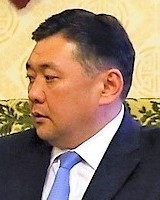
Miyegombyn Enkhbold is a Mongolian politician who was Prime Minister of Mongolia from January 2006 to November 2007 and Deputy Prime Minister from 2007 to 2012. He has been Chairman of the State Great Khural, the Mongolian parliament,from 2016 to 2019.
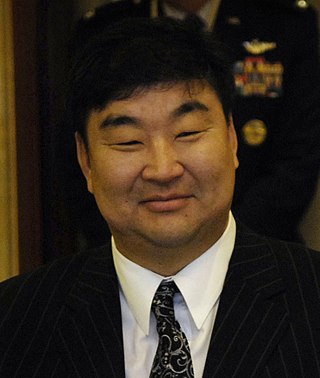
Mishigiin Sonompil is a Mongolian politician who was Mongolia's Minister for Defense from January 2006 to December 2007.
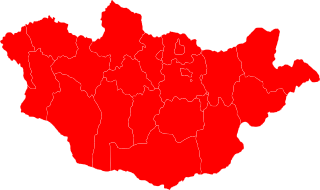
Presidential elections were held in Mongolia on 22 May 2005. The result was a victory for Nambaryn Enkhbayar of the Mongolian People's Revolutionary Party (MPRP), who received over half of the vote.
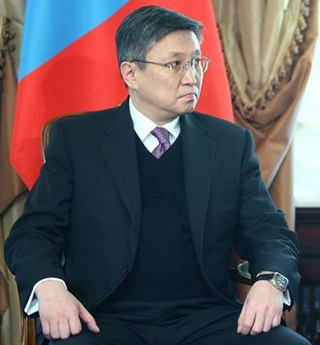
Bayar Sanj is a Mongolian politician who was General Secretary of the Mongolian People's Party from 22 November 2007 to 8 April 2010, and Prime Minister of Mongolia from 22 November 2007 to 29 October 2009. He announced on 26 October 2009, that he was going to resign his position as Prime Minister due to health reasons. He was replaced by Sükhbaataryn Batbold on 29 October 2009.

Parliamentary elections were held in Mongolia on 29 June 2008. A total of 356 candidates ran for the 76 seats in the State Great Khural. According to official results published on 14 July, at least 39 seats were won by the ruling Mongolian People's Revolutionary Party (MPRP), and at least 25 seats by the main opposition party, the Democrats (DP). Ten seats remained subject to possible recounts.

Mongolia–Russia relations have been traditionally strong since the Communist era, when the Soviet Union supported the Mongolian People's Republic. Mongolia and Russia remain allies in the post-communist era. Russia has an embassy in Ulaanbaatar and two consulates general. Mongolia has an embassy in Moscow, three consulates general, and a branch in Yekaterinburg. Both countries are full members of the Organization for Security and Co-operation in Europe.

Presidential elections were held in Mongolia on 24 May 2009. They were contested between incumbent Nambaryn Enkhbayar, supported by the Mongolian People's Revolutionary Party, and Tsakhiagiin Elbegdorj, who had support of the Democratic Party and the opposition parties. Elbegdorj declared himself the victor before the count was official but based on his party's counts. Enkhbayar admitted a narrow defeat shortly after and said that he would respect the results, marking the second time an incumbent president had lost their bid for re-election - following Punsalmaagiin Ochirbat in the 1997 election.

The Mongolian People's Revolutionary Party was a political party in Mongolia which was founded in 2010 by Nambaryn Enkhbayar. The party received approval to use the Mongolian People's Party's old name by the Supreme Court of Mongolia. Enkhbayar, former chairman of the original MPRP and a former President of Mongolia, was the party's leader. It merged back into the Mongolian People's Party in 2021.

Khaltmaagiin Battulga is a Mongolian politician and sambo wrestler who served as the 5th President of Mongolia from 2017 to 2021. He served as Member of the State Great Khural from 2004 to 2016 and Minister of Roads, Transportation, Construction and Urban Development from 2008 to 2012. Before his career in politics, Battulga was a sambo wrestling champion. He was the Democratic Party's candidate in the 2017 presidential election and was elected President with 50.6% in the run-off, the first-ever run-off election in modern Mongolian history. Mongolians are divided about his role in the 2019 Mongolian constitutional crisis.
Sainkhuugiin Ganbaatar is a Mongolian politician.

Ölziisaikhany Enkhtüvshin is a Mongolian politician who was Chairman of the Mongolian People's Party from 25 July 2012 to November 2013 and Deputy Prime Minister in the government of Ukhnaagiin Khürelsükh from October 2017.
The 2019 Mongolian constitutional crisis refers to legislation that has been criticized as threatening Mongolia's democracy by undermining its constitutional separation of powers. Though there is no consensus on the exact date the crisis began, many point to 27 March 2019, when the Mongolian Parliament adopted an unprecedented law empowering the National Security Council of Mongolia to recommend the dismissal of judges, prosecutors, and the head of the Anti-Corruption Agency. Proposed by President Khaltmaagiin Battulga, the law was ratified by a majority of the ruling Mongolian People's Party.
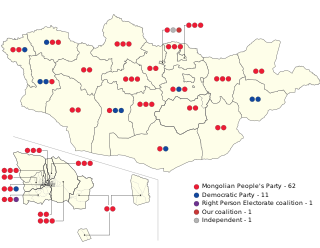
Parliamentary elections were held in Mongolia on 24 June 2020. The result was a victory for the ruling Mongolian People's Party, which won 62 of the 76 seats, a slight decrease from the 65 won in the 2016 elections.

Presidential elections were held in Mongolia on 9 June 2021. The result was a victory for former prime minister Ukhnaagiin Khürelsükh of the Mongolian People's Party, who received 72% of the valid vote. The elections were considered free and fair by OSCE. However, there was controversy as several opposition candidates were disqualified and former president Khaltmaagiin Battulga was barred from running for a second term.






















